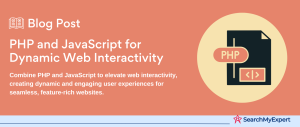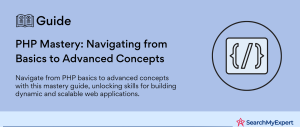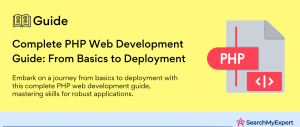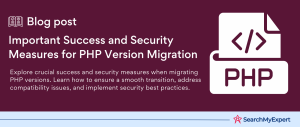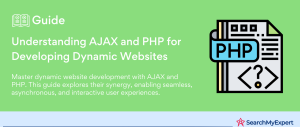PHP and Cloud Computing Integration: Harnessing the Future of Web Development
The Rise of PHP in Web Development
PHP, a powerhouse in the scripting language universe, has long been the backbone of web development. Renowned for its simplicity and flexibility, PHP has carved out a significant place in the digital realm. It’s the secret sauce behind dynamic websites, offering an easy-to-learn syntax yet powerful enough to run complex applications.
Cloud Computing: The Game Changer
Enter cloud computing – a paradigm shift in the tech world. It’s not just a buzzword; it’s a revolution. Cloud computing is about storing and accessing data and programs over the Internet instead of your computer’s hard drive. It’s scalable, reliable, and, importantly, cost-effective. From startups to giants, everyone is riding the cloud wave.
Uniting PHP and Cloud: A Match Made in Tech Heaven
Now, imagine marrying PHP’s prowess with the omnipotence of cloud computing. It’s like giving wings to a bird. This integration opens up a realm of possibilities: enhanced performance, better security, and streamlined development processes. PHP on the cloud isn’t just about hosting; it’s about redefining how web applications are built and delivered.
Stay tuned as we dive deeper into this tech symphony, exploring the intricacies of PHP and cloud computing integration – a combo that’s reshaping the future of web development.
Advantages of PHP and Cloud Integration: Elevating Web Applications
Scalability and Elasticity: Riding the Waves of Demand
PHP applications, when integrated with cloud computing, become masters of scalability and elasticity. The cloud’s robust architecture effortlessly handles traffic surges, ensuring your PHP applications adapt to changing demands. It’s like a rubber band – stretching when needed and contracting when not. This means your PHP applications can grow or shrink based on real-time usage, avoiding over or under-utilization of resources.
Cost-Effectiveness: Smart Spending with Cloud
Dollar-wise, the cloud is a game-changer. Say goodbye to hefty upfront investments in physical servers. Cloud computing operates on a pay-as-you-go model, making it a financially savvy choice. For PHP applications, this means you only pay for the resources you use. Lower operational costs, no maintenance headaches – it’s a win-win.
Increased Uptime and Reliability: Always On, Always Available
Uptime is crucial. Cloud platforms come with built-in redundancy and disaster recovery capabilities, offering unparalleled reliability. This integration ensures your PHP applications are up and running, all the time. It’s like having a safety net, ensuring continuous availability, no matter what.
Improved Development and Deployment: Speed and Efficiency Unleashed
Cloud integration transforms the PHP development lifecycle. With cloud-based tools and services, developers enjoy faster development cycles and seamless deployment processes. It’s like putting your development on fast-forward, ensuring quicker time-to-market and enhanced productivity.
Global Reach and Accessibility: Connecting Across Continents
The cloud dissolves geographical barriers. Hosting PHP applications on the cloud means tapping into a global network, making your applications accessible worldwide. This facilitates not just a broader audience reach but also fosters collaboration across continents. It’s like having a global village at your fingertips.
Popular Cloud Platforms for PHP Integration: Picking the Right One
Amazon Web Services (AWS): The Behemoth
AWS is like the Swiss Army knife for cloud services. With its vast array of offerings, it’s a powerhouse for PHP integration. Services like EC2 instances offer customizable computing power. Elastic Beanstalk simplifies deployment, while Lambda functions allow serverless computing. This makes AWS a versatile choice for PHP applications, handling everything from hosting to scaling with ease.
Microsoft Azure: The Corporate Giant
Azure, Microsoft’s cloud offering, is tailored for enterprise-level solutions. The Azure App Service streamlines the deployment and management of PHP applications. App Service Plans offer flexibility in scaling, and Virtual Machines provide the muscle for heavy-duty tasks. Azure’s integration with other Microsoft services makes it a go-to for businesses entrenched in the Microsoft ecosystem.
Google Cloud Platform (GCP): The Innovator
GCP is Google’s answer to cloud computing, and it’s as innovative as you’d expect. With services like Compute Engine and App Engine, GCP offers robust and scalable hosting for PHP applications. Cloud Functions, its serverless solution, is perfect for event-driven applications. GCP’s strength lies in its highly optimized infrastructure and data analytics capabilities.
Other Options: The Alternatives
Heroku, DigitalOcean, and Linode are like the indie bands of the cloud world. They might not have the brand recognition of the big three, but they offer compelling services for PHP deployment. Heroku is known for its ease of use, DigitalOcean for its developer-friendly approach, and Linode for its affordability. These platforms are excellent choices for smaller-scale applications or for developers seeking simpler, more straightforward solutions.
Choosing the right cloud platform for PHP integration is crucial. It’s about matching your application’s needs with the strengths of each platform. Whether it’s the versatility of AWS, the enterprise focus of Azure, the innovation of GCP, or the simplicity of alternatives like Heroku, there’s a cloud out there for every PHP application.
Integrating PHP Applications with Cloud Services: A Comprehensive Guide
Databases: The Backbone of PHP Applications
In the cloud, databases like MySQL, PostgreSQL, and various NoSQL options become the backbone of PHP applications. They provide robust, scalable storage solutions, essential for managing large datasets and ensuring smooth application performance. Cloud-based databases offer high availability, automatic backups, and easy scalability, making them an ideal choice for PHP applications that need to manage large amounts of data efficiently.
Storage: The Cloud’s Warehouse
Cloud storage solutions such as Amazon S3 buckets, Azure Blob Storage, and Google Cloud Storage are like the warehouses for your PHP applications. They provide scalable, secure, and cost-effective storage options for static content and application files. These services ensure that your data is stored safely and is accessible from anywhere, making them perfect for applications that require large-scale file storage and global access.
Networking and Security: The Fortification
Cloud services offer robust networking and security features. Virtual Private Clouds (VPCs), load balancers, and firewalls are the fortifications for your PHP applications. These tools enable you to create isolated network environments, manage traffic efficiently, and protect your applications from unwanted access. They are essential for maintaining the integrity and performance of your PHP applications in the cloud.
Monitoring and Logging: The Watchtower
Services like AWS CloudWatch, Azure Application Insights, and Google Cloud’s Stackdriver act as the watchtowers for your PHP applications. They provide real-time monitoring and logging capabilities, essential for tracking application performance and troubleshooting issues. These tools give you insights into how your application is performing, helping you make data-driven decisions to optimize performance and resolve problems quickly.
Integrating PHP applications with cloud services offers a range of benefits, from efficient data management to enhanced security. By leveraging these cloud services, you can build PHP applications that are not only powerful and scalable but also secure and easy to manage.
Best Practices for PHP Cloud Integration: Ensuring Excellence
Security Considerations: Fortifying Your PHP Applications
In the cloud, security is paramount. Implementing robust access control, encrypting data at rest and in transit, and ensuring regular backups are crucial for securing PHP applications. These practices protect sensitive data and safeguard against breaches, making your PHP application a fortress in the cloud.
Performance Optimization: Turbocharging Your Applications
Optimizing PHP code and effectively leveraging cloud resources can significantly boost application performance. Techniques like efficient coding, using appropriate caching mechanisms, and selecting the right cloud services for specific tasks ensure your PHP applications are running at peak performance. It’s like tuning a race car for optimal speed and efficiency.
Continuous Integration and Deployment (CI/CD): Streamlining Development
CI/CD practices are essential for automating the development, testing, and deployment of PHP applications on the cloud. This approach reduces manual errors, speeds up the release process, and ensures consistent quality across deployments. Think of CI/CD as a well-oiled machine that keeps your development process smooth and efficient.
Cost Optimization: Balancing Performance and Expenditure
Optimizing cloud resource usage is key to avoiding unnecessary costs. This involves selecting the right-sized resources, monitoring usage, and scaling resources according to demand. Effective cost management ensures you’re getting the most out of your cloud investment without overspending. It’s about striking the perfect balance between performance and cost.
Adhering to these best practices for PHP cloud integration not only enhances the security and performance of your applications but also ensures cost-effectiveness and streamlined development processes. By following these guidelines, you can create PHP applications that are not only powerful and scalable but also secure, efficient, and economically viable.
Case Studies: Real-World Triumphs of PHP and Cloud Integration
Transforming Industries with PHP and Cloud
The real-world success stories of PHP and cloud integration span across various industries. These case studies showcase how companies have reaped significant benefits by migrating their PHP applications to the cloud.
- E-Commerce:
An online retail giant migrated its PHP-based platform to the cloud, resulting in improved scalability during peak shopping seasons. This move led to a dramatic reduction in
downtime and a smoother customer experience, boosting sales and customer satisfaction. - Healthcare: A healthcare provider shifted its PHP patient management system to the cloud. This transition ensured secure data handling, enhanced accessibility for medical staff, and a robust disaster recovery plan, all contributing to improved patient care.
- Finance: A financial services firm upgraded its PHP-based applications to a cloud infrastructure. The result was enhanced security and compliance with financial regulations, alongside better handling of high-volume transactions.
- Education:
An educational institution moved its PHP learning management system to the cloud. The cloud’s scalability allowed them to efficiently manage the surge in online learning, ensuring uninterrupted access for students and teachers alike.
These stories illustrate the transformative power of integrating PHP applications with cloud services. The benefits are clear: improved performance, enhanced security, and cost savings, all leading to increased business efficiency and customer satisfaction.
Embracing the Future with PHP and Cloud Computing
The journey of integrating PHP with cloud computing is an adventure into a realm of limitless possibilities. This powerful combination brings forth key advantages:
- Scalability:
Effortlessly handle fluctuating demands. - Reliability: Ensure continuous availability and performance.
- Cost-Effectiveness: Maximize resource usage and minimize expenses.
- Innovation:
Unlock new capabilities and streamline development.
Developers, it’s time to embark on this path. Cloud solutions offer a gateway to building scalable, reliable, and cost-effective PHP applications. This integration is not just an upgrade; it’s a revolution in how we build and deploy web applications.
The future is bright for PHP in the cloud. Embrace it, explore it, and be part of this exciting evolution in web development.
Conclusion
PHP and cloud computing integration marks a new era in web development. This fusion offers scalability, reliability, and cost savings, transforming how developers build and deploy applications. Embrace this innovative approach to harness the full potential of PHP in the cloud, and join the evolution of efficient, powerful web solutions.
Guide your web strategy with our PHP Development Service Company.
Table of Contents
Toggle

